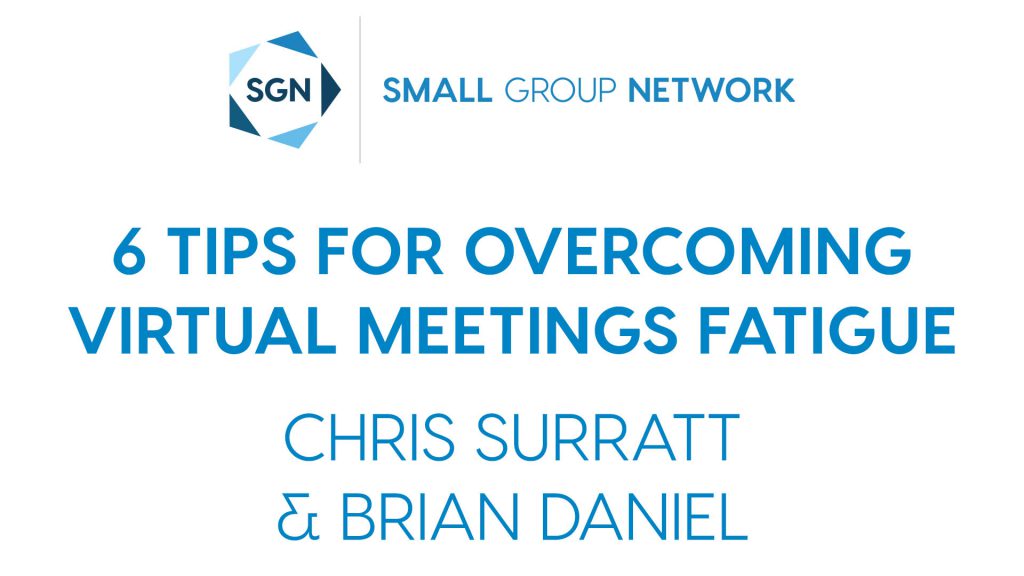Create Your Free SmallGroupNetwork.com Account Today!
By Chris Surratt & Brian Daniel
Most of us are still adjusting to a world where screen captures of Zoom meetings have become the new selfie. In this time of social distancing, our only social contacts—outside of our households—are through a camera lens and a video screen.
In so many ways, we should be thankful for the technology that has allowed us to stay somewhat connected to the world around us.
But at the same time, we’re starting to feel the fatigue that comes with staring at tiny boxes of people on our computers.
- Small groups now meet online.
- Work meetings are online.
- Worship on Sunday is streamed to TVs, laptops, and mobile devices.
- Extended family chats are facilitated through Zoom.
So, what do we do when our minds and bodies start shutting down from virtual meetings overload? Here are six tips to overcome your Zoom/Hangouts/WebEx/Skype/FaceTime fatigue.
1. SCHEDULE BREAKS BETWEEN ONLINE MEETINGS.
It’s tempting to schedule back-to-back virtual meetings because the travel time is eliminated. We can easily jump to the next Zoom link instead of taking the elevator to the 5th floor conference room.
However, we need those few minutes to reset and refresh our brain for the next task. Build in a buffer of at least 10-20 minutes between your online meetings, and you’ll notice the difference.
2. USE THE PHONE OCCASIONALLY.
As an introvert (Chris) and an Enneagram 5, talking on the phone is not one of my top 100 things to do in a day.
I’m normally a text-first kind of guy, and if absolutely necessary, I make a quick, 30-second phone call, but even I’m seeing the need for connecting with people in one-on-one conversations.
Picking up the phone to find out how someone in your small group is doing can actually be revitalizing instead of draining.
You can also occasionally call in to that virtual meeting instead of videoing in. That gives you the opportunity to walk around and even step outside during it.
3. BUILD IN BREAKS DURING LONGER MEETINGS.
It’s amazing how much concentration it takes to engage in an online meeting. There are so many more distractions and things to look at than an in-person meeting in a conference room or someone’s living room.
Normal meeting actions, like looking out of the window while someone else is talking, can seem very disengaging on a video call.
You feel the need to focus on the screen the entire time. That makes a two-hour virtual meeting feel more like four hours.
It’s important to schedule in five- to 10-minute breaks every hour for participants to use the restroom or just disengage from a screen.
Make sure you use that time to look at something other than a computer monitor. Don’t use the break to check your email or update your calendar.
4. SCHEDULE SHORTER MEETINGS.
We know virtual meetings always feel longer than physical meetings, so plan for it and keep most of your meetings shorter. This applies to online church services as well.
If your normal Sunday service is an hour and a half, consider cutting the online version to an hour. Staring at a screen is not the same as participating in a gathering.
Instead, encourage participation by offering resources for families to use for a post-service discussion.
5. KEEP A “ZOOM SABBATH.”
Having a day scheduled each week for no meetings is good advice anytime, but especially now with everything taking place in one location. As this isolation goes on, lines drawn in our lives will begin to blur.
In this time it will be easy—and unhealthy—for the office to take over too much of our homes. Because of this you might consider, as a team, making certain days “meeting free” or giving team members the right to decline meetings for various reasons.
Etiquette would warrant always giving an explanation with any decline.
6. SCHEDULE TECHNOLOGY BREAKS.
Everyone’s calendars are different, and there will be some of us who have more meetings throughout the day than others.
Increasingly it’s going to be necessary that we manage our own days and do our best to keep healthy boundaries between home, family, and the workday.
Just like how there’s such a thing as “Zoom fatigue,” there’s also such a thing as too much technology and screen time.
Our new way of life, at least for the near term, necessitates we engage screens at a higher percentage than usual.
It’s crucial we put our devices away, step outside, maybe take a few minutes to breathe the air, go for a walk or a run, or even work on professional reading assignments.
It’s for this reason we recommend regular breaks from all technology throughout the day. If it helps, put yourself on a timer. These breaks are as important as your next task.
CHRIS SURRATT (@ChrisSurratt) is the discipleship and small groups specialist for LifeWay Christian Resources, a ministry consultant and coach with more than 20 years of experience, and the author of Leading Small Groups: How to Gather, Launch, Lead, and Multiply Your Small Group.
BRIAN DANIEL (@bcdaniel) is manager of short-term discipleship resources at LifeWay Christian Resources. Surratt and Daniel co-host the Group Answers podcast





